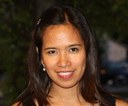Pedianostics is Awarded People's Choice Prize in Big Bang Business Competition

By: Natalie Telis
De Leoz, a PhD student in the Lebrilla Lab at UC Davis, is also part of the Milk Bioactives and Functional Glycobiology Programs of the FFHI. After attending the Food & Health Entrepreneurship Academy jointly organized by the Center for Entrepreneurship and the FFHI, de Leoz was inspired to take what she was doing in the lab to the market. She is pursuing a PhD in chemistry and has been researching technology to diagnose infants and children with potentially fatal diseases.
While attending the Food & Health Entrepreneurship Academy, the idea for Pedianostics, a company specializing in diagnostics for infants, was conceived. “We focus on non-invasive, rapid, innovative diagnostics,” she says. Pedianostics’ goal is to “solve the hard ones” – diseases with few or no diagnostic measures, like infant necrotizing enterocolitis. Necrotizing enterocolitis in particular is treatable if caught early on, but becomes increasingly serious and possibly fatal if left undiagnosed.
Many such diseases may have associated biomarkers that can be used for diagnostic purposes; bioactive compounds in biological samples such as fecal samples can often indicate something about the health status of the individual. Bioactive compounds are heavily researched, especially at the Foods For Health Institute. With the help of Andy Hargadon, who heads the Center for Entrepreneurship and the Entrepreneurship Academies, and the advisory board that was created as part of the Academy, the Pedianostics team decided to apply the research and create diagnostic tests based on biomarkers which can be obtained in a non-invasive manner.
“After the entrepreneurship camp, there was a week’s deadline for the Big Bang Competition,” says de Leoz – so her team had to formulate a business plan as fast as they could. Together with her collaborators Milady Ninonuevo and Cora Monce, two fellow affiliates of the Carlito Lebrilla Lab, as well as her husband, Gerard de Leoz, de Leoz and her team managed to submit their application on time.
De Leoz says she was overjoyed with the chance to apply her research. “I thought it was impossible, actually. There seems to be such a big gap between the lab and the market. But the entrepreneurship camp made the gap into a thin line, and I was able to step over.” De Leoz points out that it has taken a proverbial village to raise her business dream: Dr. David Mills of the FFHI inspired her to come up with the idea for the initial product, and postdoctoral scholar Daniela Barile was instrumental in helping to push the idea forward, and Drs. Mills, Underwood, Lebrilla, and German are all advisors for her venture.
“We offered a product for a premature infant necrotizing enterocolitis test, and people were excited about it,” she says. Pedianostics made it to the Big Bang finals, and investors and venture capitalists have continued following up with them. In the future, “we want to make [our goals] come true,” she says. Current efforts are focused on developing new technology to diagnose other illnesses as non-invasively as possible.
De Leoz, who has two young children herself, is well aware of how difficult it is to treat children. “They can’t tell you what is wrong – they can’t say, it hurts here,” she says. “Children’s health is an untapped part” of the diagnostics market. She hopes that Pedianostics will expand to focus on different illnesses, and that its diagnostics may eventually be applicable for other age groups as well. She is passionate about Pedianostics’ mission, and hopes it will prevail. With the “People’s Choice” Award, and product creation in progress, they are well on their way.
Links:
- Milk Bioactives Program
- Functional Glycobiology Program
- Carlito Lebrilla Lab
- Milk Oligosaccharides Project
- Infant Microbiome Project